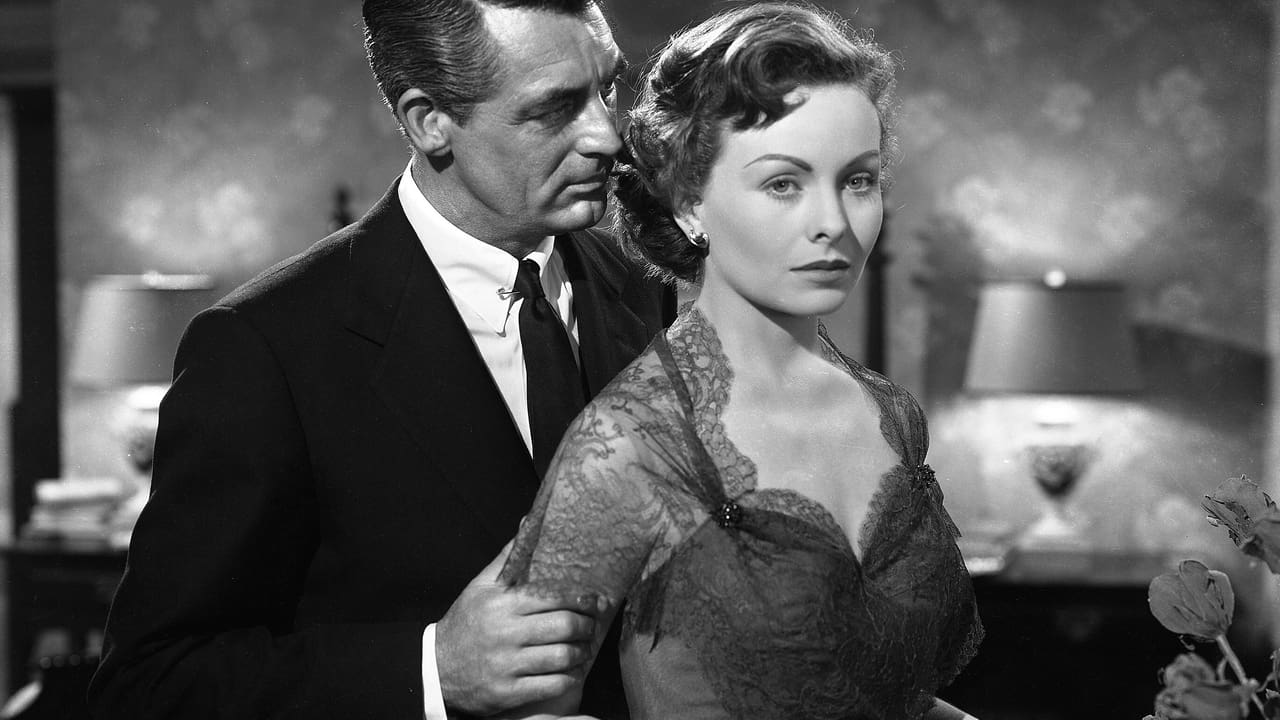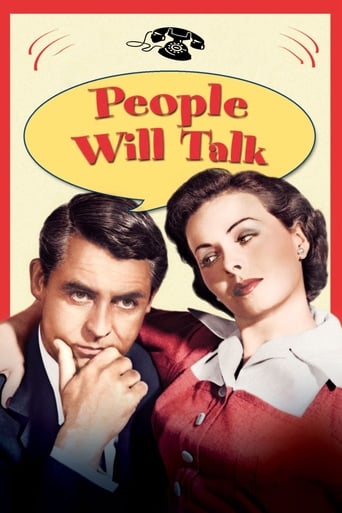

"People Will Talk" hearkens back to those classic Hollywood...oh, who the hell am I kidding: it's utter rubbish. Every second of watching it, you're slapped upside the head with the fact that it's a wooden script written by people who lacked enough wit to write for Preston Sturges or Howard Hawks, but are contractually-obligated to crank it out. Every line is a declamation with the most unnatural dialogue imaginable. This is the first time I've actually hated one of Cary Grant's characters in a film; he's absolutely insufferable, delivering one pompous pronouncement after another, through his nose. Hume Cronyn turns in a two-dimensional performance. The romance is utterly perfunctory, despite the lovely Jeanne Crain. Really, I can think of very little to recommend "People Will Talk" and I regret having wasted nearly two hours of my life on it.
... View MoreCary Grant plays a gynecologist named Dr. Praetorius (no relation to the famous character from Bride of Frankenstein, I presume) who finds himself the subject of a witch hunt at the hands of a jealous colleague (Hume Cronyn). One of Cary Grant's lesser known and under-appreciated films. It's an intelligent, thought-provoking drama from writer & director Joseph Mankiewicz, with some comedy sprinkled throughout. Obviously one wouldn't have to stretch to see some political overtones to it, given the time in which it was made. Fine work by a strong cast. In addition to Grant, who's terrific, there's the great Finlay Currie, Walter Slezak, Jeanne Crain, Sidney Blackmer, and Margaret Hamilton. Hume Cronyn makes a particularly slimy villain. One of the few flaws with the film is that Grant's character is a little too perfect. I mean there's saintly and then there's this guy. Still, it's a very good film that gives you a lot to chew on. I'm not sure why it isn't more well-known, except that a lot of the classic movie stars fit certain molds and, even today, I think fans prefer to see them in those types of films.
... View MoreThis 1951 film directed by Joseph L. Mankiewicz has more promise than it fulfilled. The problem is the character of Noah Praetorius, too good to believable. The movie stars Cary Grant as the noble Noah, Jeanne Crain as his love interest, and it has able performances by Finlay Currie, Walter Slezak, and Hume Cronyn.The gist of the plot is that Professor Elwell (Cronyn) is investigating fellow teacher Dr. Praetorius for reasons that I am unclear about. Elwll is really digging up dirt, however. Noah ignores Elwell for as long as he can, concentrating on his personal clinic where he preaches and practices treating patients as human beings, not as their maladies. Noah also conducts the student symphony orchestra, and all his female patients fall in love with him, including Deborah Higgins (Crain).Boy meets girl, boy marries girl, they have a spat, boy has a hearing to determine his fitness as a doctor, boy wins trial, boy conducts symphony orchestra.There are several problems with the movie. Elwell is never given a motive for his investigation of Noah; we have no clue if it's professional jealousy or whether there's some reasonable basis for looking into Noah's fitness to continue as an instructor at the college where both teach. Second, Noah is just too good to be true. He's so good the character lacks credibility. I laughed out loud at several scenes not because they were funny but because the situations were laughably ridiculous. Hagiography comes to mind.The movie had promise that it failed. The movie was released in 1951 at the beginning of the McCarthy era, so my wild guess is that the investigation of Noah Praetorius is somewhat related to the witch hunt for commie spies. It may also be that Mankiewicz is skewering doctors - Noah gets off several zingers, including a comparison of the professions of butchers and doctors. But nothing really is made of the hypocrisy of the investigation. Another serious issue is that Deborah Higgins is pregnant and unmarried when Noah meets her. Noah nobly marries her and will be the father to her child because he really loves her. The issues of unwed motherhood and abortion rear their heads but are swept under the carpet of witty dialogue.The movie succeeds on its supporting cast. Cronyn is good in his role as inquisitor. Slezak is warm and fuzzy as Noah's good friend. But Finlay Currie stole the movie, in my humble opinion. His Shunderson is a mystery in much of the film, a mystery about which we learn all we need to know during the hearing on Noah's fitness to continue as a professor. Currie gives Shunderson gravitas and dignity, while playing the character with little shown emotion. I liked the way the script dealt with Shunderson and Praetorius. Although Shunderson is shown as a silent hulking man, he's actually an astute observer of the human condition, and Shunderson gives Noah good advice, which by the way is readily accepted. Although Shunderson appears to be a servant of Praetorius, the two are equals. Shunderson's story is absorbing when we finally get to it.Shunderson's analysis of Elwell is where the movie should have ended. Pithy and dead center. It fully applies to McCarthy. Maybe it applies to someone today ... who can tell?
... View MoreAn adaptation of the play ''Dr Praetorius'',PEOPLE WILL TALK is basically an excuse for writer-director Joseph Mankiewicz to show off his undoubted skill for dialogue and to make various points about political,moral and ethical hypocrisy.Mankiewicz achieves this all very well in general,though somewhat at the cost of actual cinematic quality.Dr Noah Praetorius (Cary Grant),an unorthodox but effective physician who teaches at a medical school,has a misconduct charge brought against him by a somewhat envious and pompous colleague,Professor Elwell (Hume Cronyn).He also falls in love with a young woman who occasionally attends the school (Jeanne Crain), who is expecting an out-of-wedlock child by a young man who has sadly died while serving in the Korean war,and Shunderson (Finlay Currie) a frequent and rather mysterious companion and associate of Praetorius, also arouses further suspicion.Made during the era of McCarthyism at it's height,Joseph Mankiewicz was no supporter of the relentless anti-communist campaign of the time,and intelligently if not too subtly makes this point (among various others) with Cary Grant declining to clear his own name by revealing details of his colleague Finlay Currie's private affairs (which prove to be very serious) during the medical hearing.Grant as usual is excellent and convincing in the lead role,veering from a cynical,highly educated medical professional to compassionate,sensitive,non-judgmental advocate to starry-eyed romantic.Jeanne Crain is effective too as his future bride scarred by unfortunate circumstance (the unmarried mother to-be hitching up with a man who isn't the father may have been a deliberate sop to the Production Code of the time),as is Walter Slezak as a supportive colleague, Hume Cronyn in his familiar guise as a prissy,unlikable,moralistic busy-body,and Finlay Currie as a former jailed convict with whom Grant took pity on after various personal tragedies (though his accent seems a curious hybrid of his native Scottish and half-hearted Irish and American).Grant's Praetorius is part of the academic and professional establishment but somehow wholly detached from it,rebelling against the various prejudices as what would be expected from his superiors towards hapless and lower status individuals like Crain and Currie who he befriends much to the chagrin of moral arbiters like Cronyn.These are liberal attitudes with a capital L,and Mankiewicz dramatises it all with great style with much literate,witty and thoughtful writing,taking critical potshots at the political and moral atmosphere of the time.The main problem with PEOPLE WILL TALK is as is suggested by the film's title.It is very apposite as the verbosity from virtually everyone (except from Currie until near the end of the film) sometimes becomes rather wearisome and taxing,and although Mankiewicz was undeniably a great writer,he was by no means as impressive a director,with the film's original theatre origins becoming obvious through mostly flat,uninspired,static handling and slow pacing.Still,despite the dialogue-heavy (or maybe because of it) script, PEOPLE WILL TALK is an entertaining piece about an unconventional and rebellious hero from the academia, and made in a period when such characters were easily dismissed from such lofty positions for daring to show such insubordination (as many actors,writers,directors,etc. from Hollywood were in this period).RATING:7 out of 10.
... View More